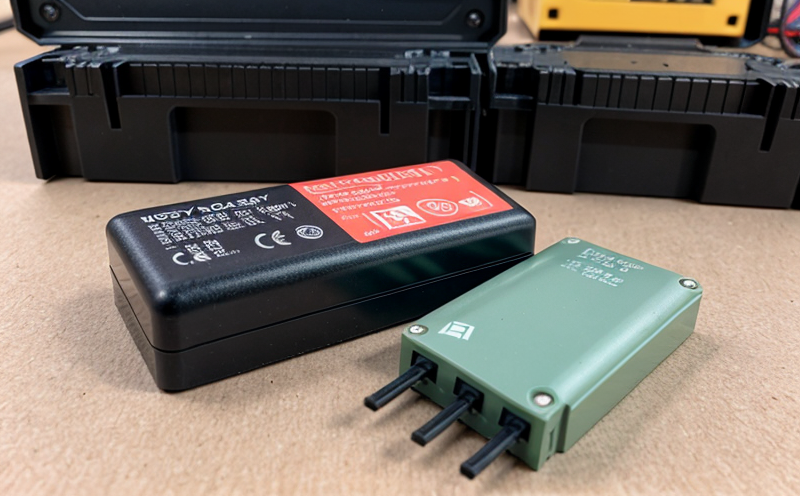EN 61982-3 Performance Testing of EV Battery Modules and Packs
The European Standard EN 61982-3 provides a framework for testing the performance characteristics of electric vehicle (EV) battery modules and packs. This standard is crucial as it ensures that batteries meet stringent safety, reliability, and performance benchmarks necessary for safe and efficient operation in EVs.
EN 61982-3 covers a range of tests designed to evaluate various aspects of battery performance including electrical characteristics such as voltage, internal resistance, capacity, energy content, power output, and more. The standard is particularly important given the rapid growth in electric vehicle adoption worldwide, which has necessitated robust testing methodologies for ensuring battery safety and reliability.
Testing according to EN 61982-3 helps manufacturers comply with regulatory requirements while also enhancing brand reputation through consistent quality assurance processes. This ensures that EVs meet not only local but international standards, thereby facilitating smoother market entry and broader adoption.
The tests outlined in this standard are typically conducted under controlled laboratory conditions to simulate real-world scenarios where batteries will be used. This approach helps in identifying potential issues early on during development stages rather than after the product has been deployed in vehicles or consumer hands.
For instance, one of the key aspects tested is thermal stability which checks how well a battery can withstand extreme temperatures without degrading performance or posing safety risks. Another critical test involves cycle life assessment where batteries are subjected to repeated charge-discharge cycles until their capacity drops below an acceptable threshold. This helps manufacturers understand the expected lifespan of their products under typical usage conditions.
Other tests include SOC (State of Charge) accuracy checks, resistance measurements, and more depending on specific requirements set forth by the standard. These comprehensive evaluations ensure that EV batteries perform optimally throughout their lifecycle, contributing to overall vehicle performance and user satisfaction.
Adhering to EN 61982-3 ensures compliance with industry best practices and international standards like ISO/IEC 17025 which governs the competence of testing laboratories. By adopting this standard, manufacturers can demonstrate their commitment to producing high-quality products that meet or exceed global expectations.
In summary, EN 61982-3 offers a robust methodology for evaluating EV battery performance through rigorous testing protocols aimed at enhancing safety, reliability, and efficiency. As the electric vehicle market continues to expand, adherence to such standards becomes increasingly vital for ensuring product quality and regulatory compliance across different regions.
Industry Applications
| Application Area | Description |
|---|---|
| Automotive Manufacturing | Ensures that electric vehicle battery modules and packs meet the required performance standards as specified by EN 61982-3. |
| R&D Laboratories | Supports research into new materials and designs for improved battery efficiency and safety. |
| Regulatory Compliance | Aids in meeting regulatory requirements set by various countries around the world. |
| Quality Assurance | Provides a framework for consistent quality assurance processes across different regions. |
| Safety Assessment | Evaluates how well batteries can withstand extreme conditions without degrading performance or posing safety risks. |
| Performance Evaluation | Determines the actual performance of EV battery modules and packs under controlled laboratory environments. |
Competitive Advantage and Market Impact
Adhering to EN 61982-3 offers several competitive advantages. It allows companies to demonstrate their commitment to producing high-quality products that meet or exceed global expectations, thereby enhancing brand reputation.
Compliance with this standard also ensures that electric vehicle batteries are safe and reliable, which is critical for consumer confidence in the technology. This can lead to better market acceptance and broader adoption of EVs, ultimately contributing to a more sustainable transportation sector.
Furthermore, by ensuring consistent performance across different models and generations of vehicles, adherence to EN 61982-3 helps manufacturers maintain high standards of quality, which is essential for maintaining customer satisfaction and loyalty. This consistency can also reduce warranty claims and service costs, providing significant cost savings over time.
In conclusion, compliance with EN 61982-3 not only meets regulatory requirements but also sets a benchmark for excellence in battery technology. It allows companies to differentiate themselves in the market by delivering superior products that are reliable, safe, and environmentally friendly.
Use Cases and Application Examples
The use cases for EN 61982-3 performance testing of EV battery modules and packs span multiple industries. One such example is automotive manufacturing where manufacturers need to ensure that their batteries meet the required performance standards as specified by this standard.
In R&D laboratories, the tests support research into new materials and designs for improved battery efficiency and safety. For regulatory compliance purposes, it aids in meeting the stringent requirements set by various countries around the world.
Quality assurance processes benefit greatly from these comprehensive evaluations which provide a framework for consistent quality assurance across different regions. Safety assessments are enhanced as well since this standard evaluates how well batteries can withstand extreme conditions without degrading performance or posing safety risks.
Performance evaluation is another area where EN 61982-3 plays an important role, determining the actual performance of EV battery modules and packs under controlled laboratory environments. All these applications highlight the importance of this standard in ensuring high-quality electric vehicle batteries that are reliable, safe, and environmentally friendly.





